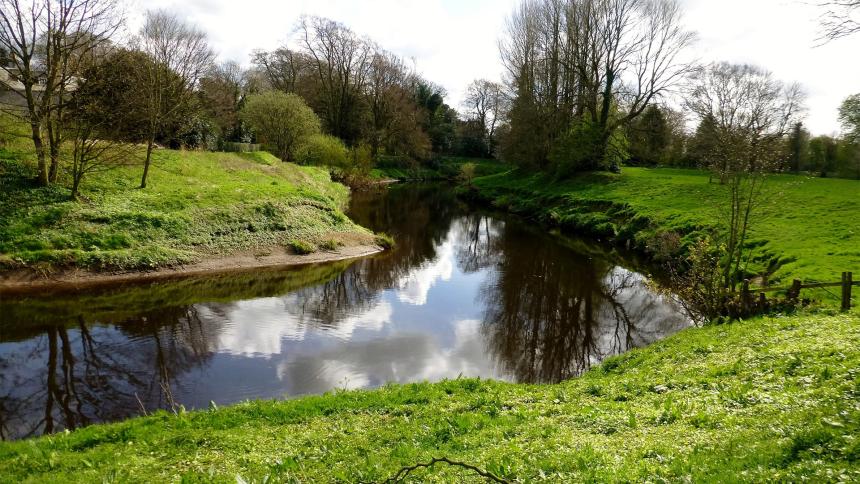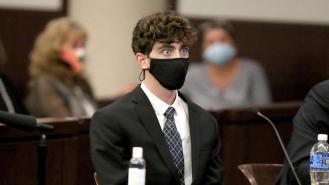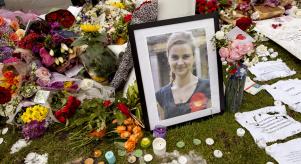
Nicola Bulley: The missing persons case hijacked by social media
St. Michael's on Wyre is a picturesque village situated in Lancashire, gracing the banks of the River Wyre. On the morning of 27th January 2023, at approximately 9:20am, a local dog-walker named Ron noticed a mobile phone lying on a bench next to the river. Initially dismissing it, Ron assumed someone had left it momentarily for a quick break.
However, as no one returned for the phone by 9:35am, Ron decided to pick it up. The wallpaper displayed a photo of a man and a woman, and Ron immediately recognised them as a couple who often walked their springer spaniel, Willow, in the area. Coincidentally, moments later, Willow appeared by the bench, and her harness and lead were later discovered halfway between the bench and the river.
Concerned that Willow's owner might have fallen into the water, Ron promptly contacted the police. The mobile phone belonged to 45-year-old Nicola Jane Bulley, a mortgage advisor with two young daughters and a partner named Paul Ansell. As the search for her commenced, police discovered that earlier that morning, at around 8:40am, Nicola had dropped her children off at St. Michael’s School. Subsequently, she walked along the River Wyre with her dog and sent an email to her employer at 8:53am.
Within four minutes, Nicola also sent a text message to a friend to arrange a meet-up for their children later in the week. By 9:01am, she had joined a Microsoft Teams call with her phone's camera and microphone disengaged. Following this, Nicola was observed walking Willow off-lead in a field adjacent to the river. This marked the last confirmed sighting of Nicola. However, mobile data indicated that around 9:20am, her phone moved toward the bench area, where Ron eventually found it.
Detective Superintendent Becky Smith led the search for Nicola, mobilising over 40 detectives to assist. In their efforts to locate her, the team initially combed the surrounding area and then meticulously reviewed extensive CCTV footage, dashcam recordings, and conducted interviews with numerous local witnesses, but none of them could account for Nicola’s whereabouts. They believed that Nicola had disappeared in a 10-minute window, but CCTV didn’t cover the specific area where she had been walking, which significantly hampered the investigation.
Early in the investigation, Nicola's disappearance was categorised as ‘high risk’. Paul had informed the police about her ‘significant issues’ with alcohol, stemming from ongoing challenges with menopause. On 10th January, an officer had conducted a welfare check at Nicola's home, prompted by concerns related to her alcohol issues, although no arrests were made in connection with the incident. A police spokesperson stated: ‘These struggles had surfaced over recent months and this caused some real challenges for Paul, and the family.’
Nicola’s disappearance immediately captured the attention of social media. The digital landscape, particularly platforms like TikTok, has revolutionised the dissemination of information, especially in the realm of true crime and missing persons cases. Online communities of amateur investigators, often called ‘internet sleuths’ or ‘armchair detectives’, can play a vital role in providing information and generating leads. However, their involvement can also lead to unintended consequences.
As news of Nicola Bulley's disappearance swept through social media, it ignited a wildfire of speculation. Some theorised that Nicola had simply fallen into the river, while others brought up ideas of foul play or suggested she had left voluntarily, perhaps to embark on a new life.
The downside emerged swiftly as false information, baseless accusations, and unfounded rumours gained momentum, particularly on TikTok. The video app became a breeding ground for pointing fingers at innocent individuals, including Nicola's partner, friends, family, and even residents of the village. Accusations ranged from implicating Paul in her disappearance to labelling her friends as 'crisis actors’, illustrating the potential harm that misinformation circulating on social media can inflict on those wrongly accused.
Armed with their mobile phones, a swarm of people descended upon the quiet village, taking it upon themselves to conduct searches and interview community members. The case exploded on TikTok, with videos related to the disappearance amassing over 300 million views. Opinions varied, with some firmly believing Nicola's lifeless body was in a derelict property on the opposite side of the river, while others pointed to a suspicious red van in the vicinity on the morning of her disappearance. The local caravan park received advice from the police to secure their doors as internet sleuths targeted the family-run business, casting accusatory shadows simply because their CCTV camera was not working.
Detective Superintendent Smith tried to put a stop to the online activity and commented in the media that they had been ‘inundated with false information, accusations and rumours which is distracting’. She said that in her 29 years in the police service, she had never seen ‘anything like it’. She said that all leads, even the more ludicrous ones, had all been investigated and ruled out, and said that they had been forced to share more information about the case than they typically would just to counter some of the ‘ill-informed speculation and conjecture’.
She declared that the police's ‘working hypothesis’ was that Nicola had fallen into the river while walking her dog, emphasising that there was no evidence pointing to any criminal activity. However, Paul remained unconvinced by this explanation and shared his scepticism with Channel 5, stating: ‘Extensive searching, as you’re probably aware, has gone on in that river. The fact that the divers and underwater rescue team and all that were in that river on the day, and thankfully found absolutely nothing, in the part where you would have to presume is her last known location.’
In the initial days, the police had conducted a thorough search of the river, extending all the way to the sea, but no significant findings emerged. Peter Faulding, the owner of Specialist Group International, an organisation that provides specialised rescue response to law enforcement, fire, and government agencies, particularly focusing on underwater searches with advanced equipment, offered his services. Despite utilising sonar equipment to scan portions of the River Wyre on 27th January, they discovered nothing. Faulding, in response, expressed doubt that Nicola was in the water based on their findings.
On 15th February, Lancashire Police held a press conference announcing that there was ‘no evidence to indicate a criminal aspect’, hoping to quell the persistent rumours and speculation on social media. However, the onslaught of speculation continued unabated. Just four days later, a couple walking along the River Wye, approximately a mile from where Nicola's mobile phone had been discovered, stumbled upon her lifeless body. They swiftly contacted the police and the area was cordoned off.
Curtis Arnold, an individual known for posting about the case on TikTok, seized the opportunity to bypass the police cordon with his mobile phone in hand. He recorded Nicola Bulley's body on the water's edge and uploaded the footage to his 13,000 followers. Arnold was subsequently arrested on charges of malicious communications and perverting the course of justice.
In the wake of the discovery, Peter Faulting was hit by a wave of criticism for not being able to find Nicola earlier, but he explained that her body was found not in the river but instead in the reeds, which the sonar equipment did not penetrate. He stated: ‘My previous comments saying that if Nicola was in the river, I would find her, still stand. My team and I at SGI did all we could to assist this family with only our best intentions. I am sure I can say this of everyone who has been involved in this difficult search.’
An inquest was launched into Nicola’s death, and it found that she had accidentally drowned after suffering from ‘cold water shock’.
Following the inquest, Nicola’s family released a statement which read: ‘Sadly, we feel the need to again raise and address the issue of social media. It's upsetting that we've continued to receive negative targeted messages and still witness wildly inaccurate speculation being shared over numerous platforms. We encourage people to look at the facts, the evidence which has been heard during the inquest, and the conclusion reached by the Coroner, to ignore any amateur views and opinions, and be mindful of the impact words bring.’
Header Image Credit: (CC BY-SA 2.0)









